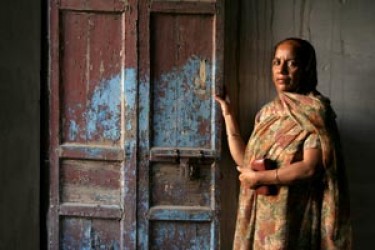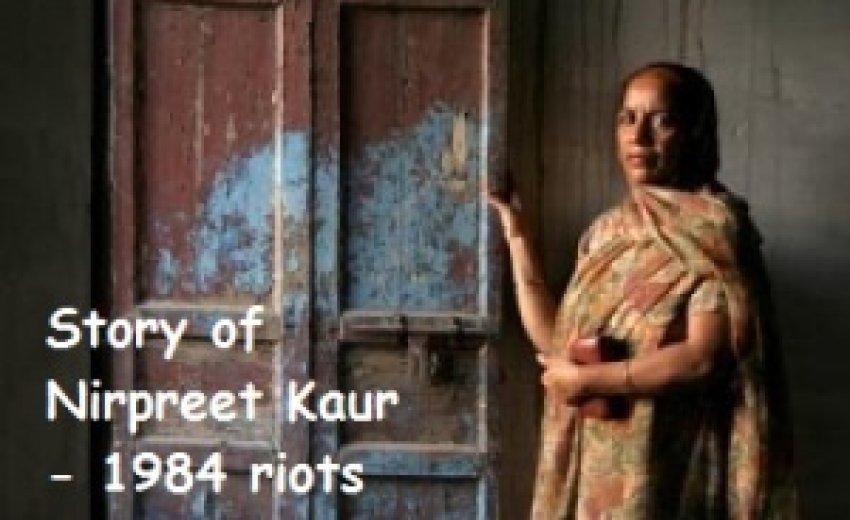‘I Don’t Think Justice Will Come’
NIRPREET KAUR, Lost her father
THE PHOTOGRAPHS of the two men who are significant to Nirpreet Kaur’s life hang on the walls of her living room. The first is a faded black-and-white photo of her father. The second is a framed photo of Jarnail Singh Bhindranwale, the Khalistani separatist leader who was killed by the Indian Army in Operation Bluestar of 1984.
 An hour later, Nirpreet recalls, Balwan Khokhar, the Youth Congress leader, came to her father requesting him to “settle the matter”. A day earlier, when violence against Sikhs broke out following the assassination of Prime Minister Indira Gandhi by her two Sikh bodyguards, Khokhar had sworn to the Sikhs that they would be protected from violence. Nirpreet was 16 years old on November 2, 1984 when the mob came for her father, Nirmal Singh. The gurdwara next to their house in south Delhi’s Raj Nagar had been set ablaze, and a mob of about 450 was looking for more Sikhs to butcher. The Sikhs of Raj Nagar decided to confront the mob.
An hour later, Nirpreet recalls, Balwan Khokhar, the Youth Congress leader, came to her father requesting him to “settle the matter”. A day earlier, when violence against Sikhs broke out following the assassination of Prime Minister Indira Gandhi by her two Sikh bodyguards, Khokhar had sworn to the Sikhs that they would be protected from violence. Nirpreet was 16 years old on November 2, 1984 when the mob came for her father, Nirmal Singh. The gurdwara next to their house in south Delhi’s Raj Nagar had been set ablaze, and a mob of about 450 was looking for more Sikhs to butcher. The Sikhs of Raj Nagar decided to confront the mob.
“Khokhar sweet-talked my father into coming with him for a compromise,” says Nirpreet. But Khokhar went straight to the mob and handed Nirmal Singh over. The oldest of three siblings, Nirpreet, ran to the mob but could only watch helplessly as her father was tied up and set ablaze.
The family then fled to safety. When they returned to collect his ashes for Nirmal Singh’s last rites, the area had been swept clean.
They moved from one rented house to another before settling in a home in west Delhi’s Tilak Vihar in 1986. Nirpreet moved to Chandigarh in September 1985 for her post-graduate degree. “My life then changed drastically,” she says. “I joined the Khalistan movement to avenge the brutal killing of my father.” Nirpreet married a militant in November 1986; the reason why Bhindranwale’s portrait hangs next to that of her father’s.
As a functionary of the then dreaded All India Sikh Students Federation, Nirpreet came in contact with those involved with the Khalistan movement, an armed insurgency fighting for an independent Sikh homeland in Punjab, and became part of the militancy that ravaged the state for over a decade in the 1980s.
Twelve days after her wedding, the Delhi police picked up her husband. He was never heard of again. Nirpreet, then pregnant with her son, was declared an absconder. She went into hiding. In December 1986, Nirpreet’s mother, Sampooran Kaur, was sentenced to three years in Delhi’s high-security Tihar jail for “sheltering a terrorist”. “She didn’t even have an inkling of what I was up to when they arrested her,” Nirpreet says.
In May 1988, Punjab Police and paramilitary forces launched Operation Black Thunder against armed militants who had built up a fortified stronghold within the Golden Temple in Amritsar. At least 40 extremists were killed and several arrested.
Sampooran Kaur was watching the news on television in the jail. She leapt with joy as she caught a fleeting glimpse of her daughter among those arrested. She hadn’t heard from Nirpreet for over a year.
Five months after her arrest in Amritsar, Nirpreet, by then a mother of a one year- old boy, was also brought to Delhi’s high-security Tihar Jail. Sampooran rushed to Nirpreet’s cell as soon as the gates were unlocked. “She wouldn’t stop weeping,” recalls Nirpreet, a tear betraying her resolute demeanour. Other inmates gathered around the cell to witness the reunion of a 20-year-old “dreaded terrorist” and her mother.
| Nirpreet joined the Khalistan movement to avenge the killing of her father. She married a militant in 1986. ‘I went to jail for this,’ she says, ‘but those who massacred Sikhs still roam freely.’ |
AFTER EIGHT-and-a-half years in prison, Nirpreet was acquitted on October 24, 1996. Though, her family was supportive, it took time to start life anew. Today, Nirpreet, a readymade garments exporter, is actively involved in fighting for justice for victims of the 1984 Sikh carnage.
She is one of the 11 witnesses who, in January this year, testified before the CBI against Congress leader Sajjan Kumar.
On the morning of November 2, 1984, Nirpreet says Kumar stood up in a police jeep near Palam colony and announced: “No Sikh should live. If anyone gives shelter to Sikh families, their houses will be burnt.” The CBI is yet to file a chargesheet against Kumar.
Though she regrets having taken the extreme step of joining the Khalistan movement, she is not unhappy with the way life has turned out for her. “I was forced to take that step because of the Congress government’s injustice. The irony is that while I have been punished for what I did after the 1984 killings, those who executed the massacre of Sikhs still roam freely.”
The situation took a new turn following the CBI’s exoneration of Jagdish Tytler this month. A Delhi court has postponed the hearing on the CBI’s plea that the case against Tytler be closed. The survivors of the Sikh killings still live in the hope that the courts will bring them justice. Till that day, they will, like they have been doing for almost 25 years, relive the horror of 1984. “I don’t think we’ll ever get justice because the politicians are bothered only about votes,” rues Nirpreet.
Originally published by archive.tehelka.com
